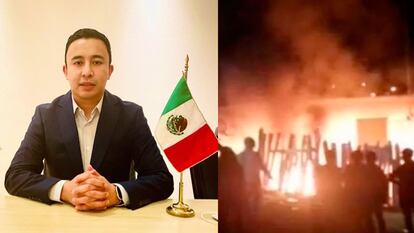Mexican political adviser burned alive in public lynching
Daniel Picazo was killed by an angry mob which wrongly identified the 31-year-old as a child abductor


Residents of a small Mexican community burned alive a young political adviser on Friday night following false reports of a child abductor on social media. The 31-year-old victim, called Daniel Picazo, was from the village of Papatlazolco in the state of Puebla, and returned to visit on occasion. Picazo’s family says that he must have gotten lost on his way to the village, where he was swamped by a mob of locals. According to local media, residents in the area said he was roaming the streets in the van and was accompanied by a minor who he had allegedly abducted – an accusation that Mexican authorities have discounted.
Local media reported that residents in Papatlazolco had received a series of WhatsApp messages on Friday warning of child abductors in the area and urging families to take precautions. The rumors then claimed that a man had tried to abduct a minor in his van, and the community organized to stop the alleged criminal. The 31-year-old, who was an adviser to a lawmaker in the State of Mexico, was traveling with someone else and was wrongly identified as the culprit. He was beaten and taken to a sports field, where he was tied up and doused with gasoline and set alight, according to local media.
Police and health workers rushed to the site, but the angry mob stopped them from reaching Picazo. By the time they could help, it was too late. According to local media, around 30 locals took part in the attack and another 200 stood by and watched.
After his death, Picazo’s sister posted a message on Twitter, describing her brother as a professional, “who loved travel and life.” She also expressed her “disgust” at the people responsible for killing Picazo “for being in the wrong place at the wrong time.”
Lynchings are not unusual in Mexico, where some communities take justice into their own hands when they are victims of a crime or suspect a culprit. These acts of violence typically take place in isolated areas, where justice is slow to arrive or never arrives at all. In some cases, these communities are used to imparting justice according to their customs with little or no respect for the rule of law.
In the case of Papatlazolco, it is not known if any arrests have been made; the Prosecutor’s Office is investigating the matter.
The City Council of Papatlazolco condemned the public lynching and defended the legal procedures to combat crimes: “We will always act in accordance with the law, since justice by one’s own hand is not justice, but barbarism,” they said.
Tu suscripción se está usando en otro dispositivo
¿Quieres añadir otro usuario a tu suscripción?
Si continúas leyendo en este dispositivo, no se podrá leer en el otro.
FlechaTu suscripción se está usando en otro dispositivo y solo puedes acceder a EL PAÍS desde un dispositivo a la vez.
Si quieres compartir tu cuenta, cambia tu suscripción a la modalidad Premium, así podrás añadir otro usuario. Cada uno accederá con su propia cuenta de email, lo que os permitirá personalizar vuestra experiencia en EL PAÍS.
¿Tienes una suscripción de empresa? Accede aquí para contratar más cuentas.
En el caso de no saber quién está usando tu cuenta, te recomendamos cambiar tu contraseña aquí.
Si decides continuar compartiendo tu cuenta, este mensaje se mostrará en tu dispositivo y en el de la otra persona que está usando tu cuenta de forma indefinida, afectando a tu experiencia de lectura. Puedes consultar aquí los términos y condiciones de la suscripción digital.








































